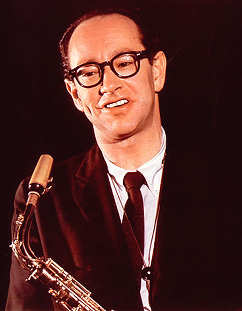| B i o g r a p h y |
 Paul Desmond (born Paul Emil Breitenfeld;
November 25, 1924 - May 30, 1977) was an American jazz alto saxophonist
and composer, best known for the work he did in the Dave Brubeck
Quartet and for penning that group's greatest hit, "Take Five". He was
one of the most popular musicians to come out of the West Coast's cool
jazz scene, and the possessor of a legendary and idiosyncratic wit. In
addition to his work with Brubeck, he led several of his own groups and
did significant collaborations with artists such as Gerry Mulligan, Jim
Hall and Chet Baker. After years of chain smoking and general poor
health, Desmond succumbed to lung cancer in 1977 following one last tour
with Brubeck.
Paul Desmond (born Paul Emil Breitenfeld;
November 25, 1924 - May 30, 1977) was an American jazz alto saxophonist
and composer, best known for the work he did in the Dave Brubeck
Quartet and for penning that group's greatest hit, "Take Five". He was
one of the most popular musicians to come out of the West Coast's cool
jazz scene, and the possessor of a legendary and idiosyncratic wit. In
addition to his work with Brubeck, he led several of his own groups and
did significant collaborations with artists such as Gerry Mulligan, Jim
Hall and Chet Baker. After years of chain smoking and general poor
health, Desmond succumbed to lung cancer in 1977 following one last tour
with Brubeck.
Following the conclusion of World War II, Desmond started working in
Palo Alto, California, at the Bandbox. He also worked with Brubeck at
the Geary Cellar in San Francisco. Desmond soon hired Brubeck, but cut
his pay in half and then replaced him altogether after taking him along
to Graeagle at The Feather River Inn for gigs; this was done so Desmond
could gamble in nearby Reno. In 1950 Desmond left for New York City
playing alto and clarinet for Jack Fina, but returned to California
after hearing Brubeck's trio on the radio.
The story of their encounter is somewhat humorous. Brubeck - married
with three children and holding a grudge from his earlier experience
with Desmond - instructed his wife, Iola, not to let him set foot in his
house. However, Desmond came to his home in San Francisco one day while
Dave was out back hanging diapers on a laundry line, and Iola let him
in and took him to Brubeck. Apparently all the begging in the world
would not convince Brubeck to hire him, at least not until Desmond
offered to babysit Brubeck's children.
Desmond had first met Dave Brubeck in 1944 while still in the military.
Brubeck was trying out for the 253rd Army band which Desmond belonged
to. After making the cut he—unlike Desmond—was sent to war in 1944.
Desmond once told Marian McPartland of National Public Radio's Piano
Jazz that he was taken aback by the chord changes Brubeck introduced
during that 1944 audition. After convincing Brubeck to hire him
following his stint with Jack Fina, the two had a contract drafted (of
which Brubeck was the sole signatory); the language forbade Brubeck from
ever firing him, ensured Brubeck's status as group leader, and gave
Desmond twenty percent of all profits generated from the quartet. That
is how the Dave Brubeck Quartet had its start, a group that began in
1951 and ended in December 1967. The quartet became especially popular
with college-age audiences, often performing in college settings like on
their ground-breaking 1953 album Jazz at Oberlin at Oberlin College, or
on their recordings on the campuses of Ohio University and the
University of Michigan, among others. The success of the quartet led to a
Time magazine piece on them in 1954, with the famous cover featuring
Brubeck's face. The group played until 1967, when Brubeck switched his
musical focus from performance to composition and broke the unit up.
During the 1970s Desmond joined Brubeck for several reunion tours,
including "Two Generations of Brubeck". Accompanying them were Brubeck's
sons Chris Brubeck, Dan Brubeck and Darius Brubeck. In 1976 Desmond
played 25 shows in 25 nights with Brubeck, touring the United States in
several cities by bus.